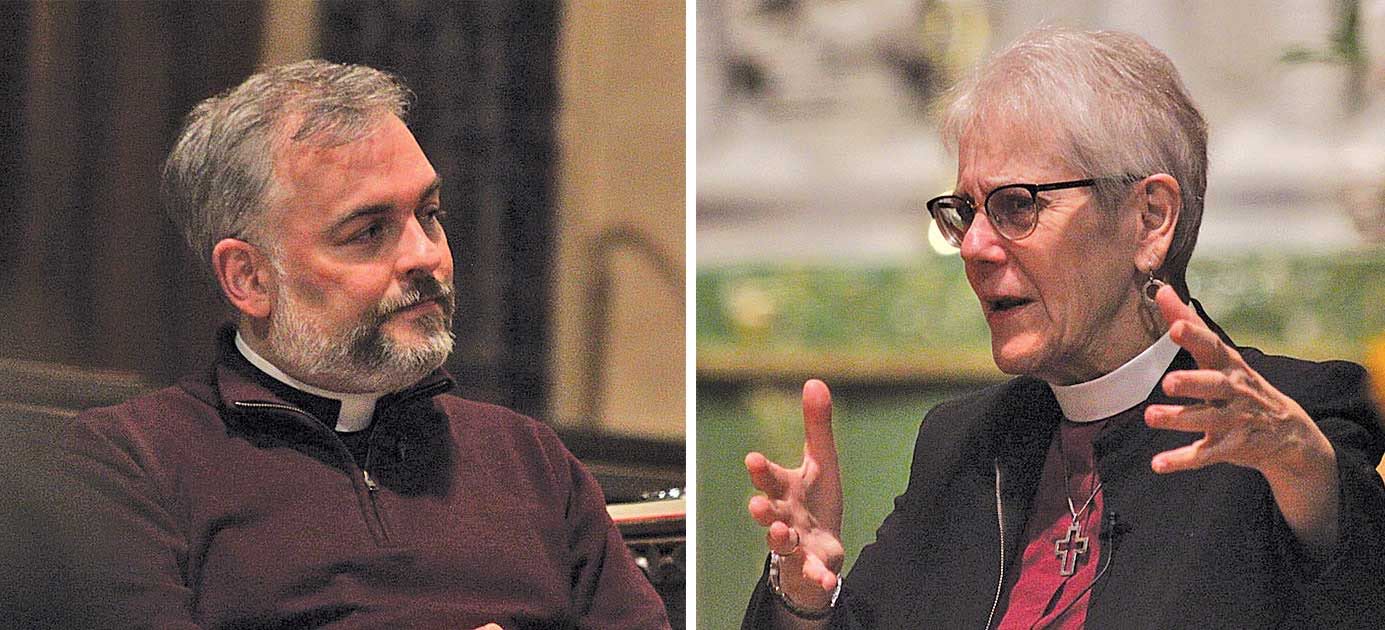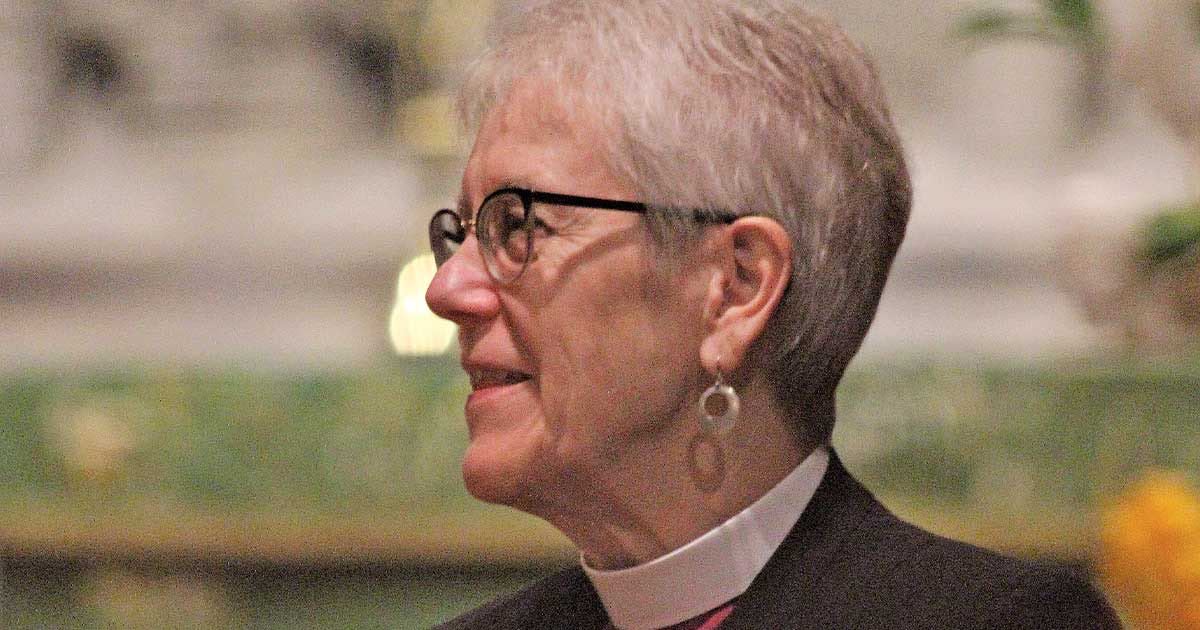On October 20th, the Primate of the Anglican Church of Canada, Archbishop Linda Nicholls, spent an evening with the public at the Cathedral of St. John the Baptist in St. John’s, taking part in a question and answer session. In the absence of our bishop, Archdeacon Charlene Taylor, in her capacity as the diocesan administrator, welcomed Archbishop Nicholls to the Diocese of Eastern Newfoundland and Labrador. Father Jonathan Rowe conducted the interview and posed the questions, submitted in person or online, to the Primate.
To begin the evening, Nicholls was asked where she had seen God at work in the world lately, and what has she seen God doing. The Primate discussed the difficulties of seeing God in the midst of the pandemic because so many of our familiar ways have been taken away. But, this has forced us to find God in new places, like on Zoom—different than in person, but still good. She has also found God in people’s ability to relax their dependance on their buildings—“You know, we can be the church without the building.” God has prodded us to be more creative, and has been in the midst of us.
Rowe asked about the other challenges that the Church faces, besides those that have been presented by the pandemic, and it was acknowledged that there were many challenges, such as shrinking church attendance, that existed long before COVID-19 became an issue. Nicholls said that falling congregation size was once blamed on the clergy not working hard enough, but that we know now that it is caused by a social shift—a rapid change in technology and world events. We have also seen a decrease in our society’s trust of institutions. This must change the way that we communicate the Gospel. We need to stop trying to hide the things that we have done that were wrong in the past, like our history with the residential schools and systemic racism, and find new ways to be authentic. We must proclaim Christ’s love for all people.
The focus of the questions then shifted to a discussion of mental health, in particular as it affects the members of the clergy.
Nicholls discussed the increased anxiety, worldwide, that has come from the very real fears from the pandemic. All of the clergy, and the House of Bishops, are talking about the level of stress that they’re feeling. They bear the worries of their congregations, and are often unable to do the pastoral work that they’ve been trained to do. She encouraged us all to be gentle with each other, because the clergy are making difficult decisions, and trying to do what they think is best. Nicholls said, “When you’re really angry with [the clergy], take a deep breath, and write a letter that starts off with the affirmations, and then express gently your disagreement, and then live with the decision they’ve made, because we are a community together…and are called to walk together.”

Discussion then moved on to how leaders in the Church walk that line between having frank and open conversations around mental health, severe stress, and around suicide, and having a private life. Nicholls addressed the pertinent nature of those questions in the Diocese of Eastern Newfoundland and Labrador. She said that it is a painful thing to have walked with those for whom the stress had been so great that the choice to take one’s life seemed like the only answer. It isn’t only a concern here, but also is a huge problem in Indigenous communities, where hopelessness is all too common. “Our hearts break with them at the brokenness of our lives and our communities. And the only place that we can go with that is to God.” Nicholls stressed that we need to be honest when suicide happens so that we can support each other, and that we need deep compassion rather than shame—a recognition that we do not understand the human mind. The Christian community must walk together through the darkness.
When asked how we should best prepare future leaders, both lay and ordained, from the next generation for work within the church, Nicholls said that we just don’t know what the future will bring. Our preparation needs to be discipleship—foundations of a faith life that can respond by reflection, in a theological way, to see where God is present and what God is calling us to do. Obviously things like pastoral and liturgical training remain very important, but there are other things that we may need to adapt in order to meet the needs of the future. We need to be willing to try things, and be willing to fail, and then to discern a new direction.
The role of the pastor has been changing a great deal over the last few decades—people are busy, and less inclined to welcome a drop in visit from their priest. But crisis pastoral care will probably stay much the same, but we have discovered that pastoral care needn’t happen in person. We have learned to reach out online for prayer and pastoral visits, and have found this to be a new valuable tool in our toolboxes.
The Primate then addressed the question of stress around maintaining buildings vs. maintaining ministry when we cannot afford to do both. Nicholls explained the spiritual exercises of St. Ignatius of Loyola, and “Ignation Indifference.” In this context, the word “indifference” does not mean not caring, but that you “hold something lightly, and accept it and celebrate it, and rejoice and participate in it to the degree that it brought you close to God. And if it does not, that you could let it go without anxiety, without fear…that you could just release it.”. We need some of our buildings for sure, but how much of our resources should they be able to absorb in order to be maintained? Can we share them? We have to hold our buildings lightly—we cannot fight tooth and nail until there’s nothing left. Is your church building more important that your relationship with God? Can you live out your baptismal covenant really well in that place?
Nicholls reflected about the good things that have come out of this time of pandemic which she would like to see continue—the ability to meet online for national committees at a much lower cost than bringing people together from across the country, for example. The ability to balance the need for occasional in person meetings vs. online meetings is a good thing. Also, online ministry training programs for people in remote places became a possibility, as well as things like online Gospel jamborees. The resurgence of the daily offices has been a positive change—we have reclaimed the riches of our Anglican tradition.
Finally, Nicholls shared with us her “Primate’s Picks” of books and shows. Louise Penny’s books are a favourite read. “Call the Midwife” is a show that she very much enjoys, especially because it looks at the social issues of that time and place, and it also has an honest portrayal of Anglican nuns. Another favourtie is the show “Grantchester,” and its wresting with issues of human sexuality. She confessed to being very much a cat person, which keeps her very honest about life.
The evening closed out with the BCP office of Compline, led by the Archbishop, with music provided by the choir and organist of the cathedral.


